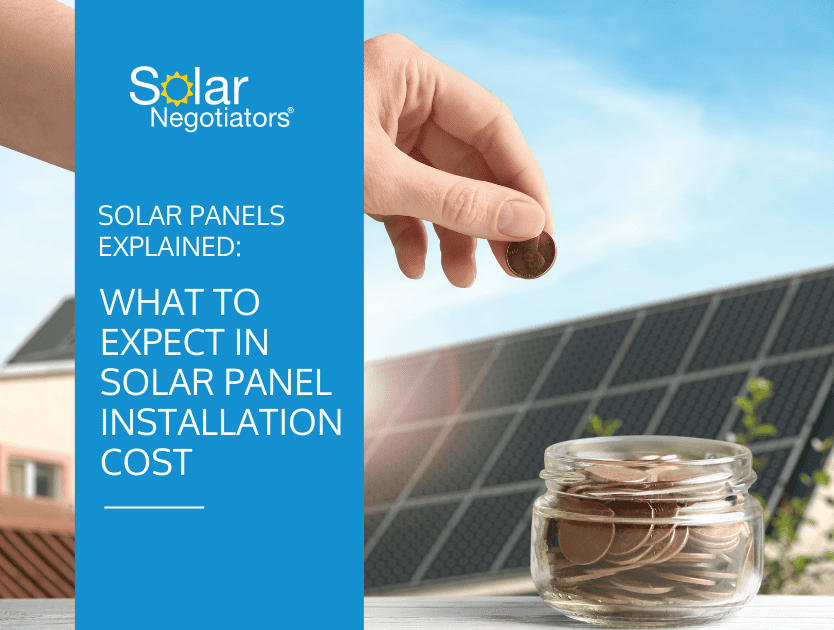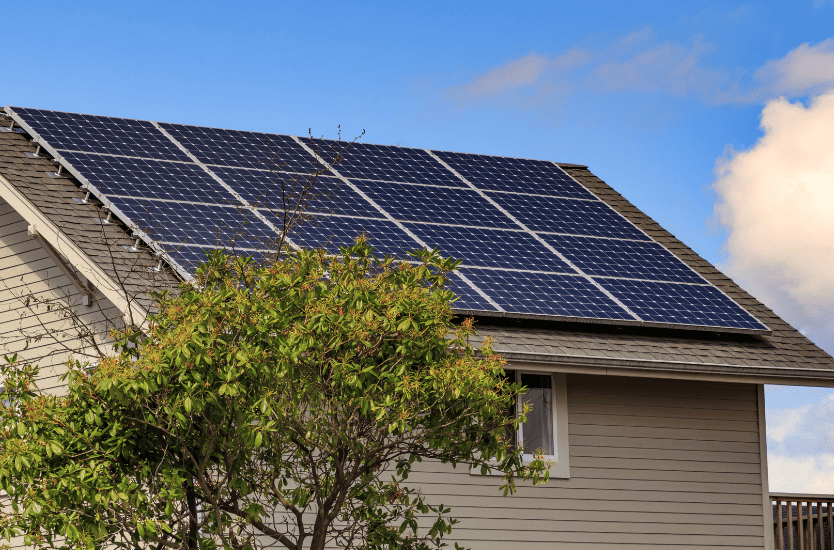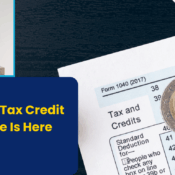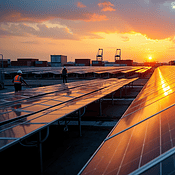
Solar Panels Explained: What to Expect In Solar Panel Installation Cost
(Update: The Residential Solar Tax Credit will no longer be eligible after 12/31/25.)
Installing a solar panel system is a positive long-term investment decision. It completely transforms the way your home produces and uses energy. If you’ve made up your mind to move forward with a solar panel installation, you’re likely familiar with the major benefits like lower electric bills, reduced carbon footprint, and energy independence.
The appeal of solar is obvious, but the cost of installation may cause some hesitation. Don’t let it! Even if the upfront cost seems daunting, there are many ways to make it more affordable. Over time, the system eventually pays for itself, too, so you won’t simply be flushing your money down the drain (or into the grid). Below, you’ll find a breakdown of installation costs and ideas for making it more affordable.

What Goes Into The Costs of Solar Panel Installation?
Solar panel energy systems are not a one-size-fits-all solution, they are custom built by your solar installation provider based on your needs. There are several factors to consider that go into the costs of getting solar panels. Understanding the factors that contribute to these costs will help you make an informed decision and weigh out the benefits. In most cases, these costs will vary based on your energy usage, energy preferences, financial goals, and what type of home you live in. We’ve highlighted the most important aspects when it comes to solar costs, all of which will be dependent on your home, energy usage, location, and company you select for your solar installation project.
Solar System Size
The main contributing factor to cost will be how big of a solar panel system you’ll need for your home. The dimensions of the system will be measured in kilowatts (kW) and this will be calculated using your home’s annual utility consumption (energy usage). A good way to calculate your energy usage here is to review your previous energy bills and show them to your solar sales professional so they can calculate how many solar panels you’ll need.
Solar Panel Type
Solar panels come in different types based on cost, longevity, energy efficiency and flexibility. The most popular type that is used for many residential homes are photovoltaic, or PV solar panels as they are the least expensive, and the most flexible types of solar panels. PV solar panels convert sunlight directly into electricity using the photovoltaic effect.
The good news about PV solar panels is that their cost has gone down drastically. This has led to a large growth of solar panel interest in the last decade. While panel costs may range from $0.70 to $1.50 per watt, the price to install them is typically a lot higher due to labor, parts, operational costs and permits.
Roof Condition For Solar
The condition of your roof should be inspected by a professional before you install solar. If the roof is toward the end of its life, it will be better to replace your old roof, and then install solar panels. Older roofs will require a re-roof so it’s important to think about that before you’ve already gone solar that way, it will save you on the total costs.
Electrical Capabilities For Solar
Before going solar, you should have your electrical panel inspected to make sure it can handle solar. This can be performed by your solar sales professional at no cost, so no need to spend any additional upfront costs for an electrician to inspect your home. They will be trained to identify if your current electrical panel can accommodate the amperage of the system they are designing for your home. In the case that the power of the system is too much, you may need what is called a Main Panel Upgrade. This can add to the overall cost of your solar project, but the additional costs are vastly outweighed by the additional solar power you’d receive from a larger system.
How Do I Know If I’ll Need to Upgrade My Electrical Panel?
The need for an upgraded panel is most common in older homes and with solar battery system installations. Electrical panel breakers are rated by the amount of amps they can handle to ensure they don’t trip. In most cases, the number of amps should be at least 200 amps but it will depend on the size of your home.
Energy Storage Solar Battery
Despite a common misnomer, when you go solar, you’re not completely “off grid.” You’re still connected to the grid and, if you have solar alone (no battery), when the lights go off, yours do too even when your solar system is producing energy. If you have an energy storage battery, however, when the lights go off, yours stay on!
In regards to costs, an energy storage battery makes a lot of (dollars and) sense due to the NEM 3.0 regulatory ruling. In California, installing a solar battery has become more essential than ever with the introduction of NEM 3.0 which reduces the bill credits utility companies give you for the excess solar energy you’re producing that is sent back to the grid. By pairing solar panels with a battery, you can store the excess energy you produce and use it later instead of sending it back to the grid for minimal bill credit. Instead you’ll be saving the excess energy you produce in your battery and using it during times of day (4-9 pm in most cases) when utility rates are the highest. By having a battery, you’re not only avoiding reliance on the grid, you’re also maximizing the benefits of your solar system.
The cost of an energy storage battery will depend on the brand and the battery’s kW capacity, which should be tailored to your energy usage and your home’s energy production potential. A properly sized system ensures you have the power you need when you need it most!
Labor and Installation For Solar
Labor and solar installation costs will vary region to region and company to company. It is always a good idea to research various local companies around your area and contact them to get more information on price, professionalism, and expertise.
At Solar Negotiators, our team of solar experts can identify what you’ll need in order to ensure a smooth solar installation process and long-term success with your solar purchase. Our team can inspect your roof, electrical panel, and walk you through the different solar panels and batteries that are handpicked as the best the market has to offer.
How Much Do Solar Panels Cost On Average?
Before getting into how to save money, let’s take a look at the expected costs. The average price for solar panels and installation in the US is around $15,000 at the low end but stretches up to around $35,000.
With the added price of battery storage, solar can cost $25,000-$60,000. The price will vary drastically depending on your energy needs, your goals, and if you want backup capabilities for your home.
Contact a solar professional to determine the right system for your home and pinpoint your costs.
Why Would I Install A Solar Panel System?
The long term benefits of installing a solar panel system outweighs the current investment purely from a cost perspective. You typically can make your money back in the first 10-15 years depending on your setup, after that, it is all extra money saved. Besides the cost savings benefits, you also enjoy energy outside of the grid and can supply your own energy in case of emergencies and blackouts from the main power grid.
Are you curious to find out what you could potentially save with solar? Get an estimate! We‘ll calculate what you can expect to save by switching to solar energy.
How Can Homeowners Save on Solar Panel Installation?
For most people, spending $30,000 – $65,000 on something (even if it’s worthwhile) seems out of reach. It doesn’t have to be. Installing a home solar system has a literal lifetime of benefits, whether you choose to stay at the house for the rest of your life or sell it and recoup some of the cost in home equity.
The long-term benefits don’t always make the upfront costs seem attainable. Tax credits and incentives do. The federal solar tax credit alone offers homeowners as much as 30% credit, saving you $7,500 off that $30,000 total cost and installation price. (Update: The Residential Solar Tax Credit will no longer be eligible after 12/31/25.) Certain states and areas offer even more incentives for installing solar, too, lowering your costs even further. You don’t have to wait years for the money to trickle back in, either. You’ll see it in your account at tax time!
How Financing Can Affect Your Price For Solar Panels
If the long-term savings and tax incentives still haven’t convinced you that you can afford to go solar, it’s time to discuss financing. You don’t have to have every penny sitting in your bank account to move forward with solar. There are many options out there that can make solar savings possible.
Solar Loans
Solar loans allow you to pay over time for your system and still collect perks like tax credits and incentives. To secure a solar loan, you may opt to borrow against your home’s equity (if you’re eligible) or go through a bank or credit union.
Certain states also offer financing tied to their energy company, so you’ll pay for your solar as part of your regular monthly energy bill. This isn’t available everywhere, so check with your local utility company for any similar solar programs.
Installer Financing
Some solar installation companies offer financing options. If you choose to go with a company providing that service, you’ll make monthly payments on your system until it’s completely paid off.
Some installers may also offer leasing options or Power Purchase Agreements, meaning you make use of the system on your property but the business still owns it. With these agreements, you don’t qualify for tax credits or incentives but still have the use of solar energy. With many ways to finance and reduce the cost of a permanent installation, most households benefit more from purchasing their system rather than leasing it or entering a PPA agreement, but each situation is unique.
Prepaid Solar Loans
Prepaid solar loans are revolutionizing the way people finance their solar energy systems. This option enables homeowners to benefit from the solar investment tax credit while enjoying upfront savings. In the past, homeowners had to rely on traditional loans or expensive upfront payments to install solar panels. However, with prepaid solar loans, the process has become more accessible and affordable. These innovative loans allow homeowners to prepay for their solar system electricity production, eliminating the need for hefty down payments or high-interest rates.
By paying for the system’s energy upfront, homeowners can lock in a fixed rate for the duration of the loan, protecting themselves from potential future electricity price hikes. This approach not only makes solar energy more affordable but also provides peace of mind knowing that the investment will pay off over time. Prepaid solar loans are empowering homeowners to embrace clean energy without breaking the bank, contributing to a greener and more sustainable future.
DIY Solar vs. Professional Installation
While Solar Negotiators would strongly advise against installing your own solar panels on your roof, we understand this is a solution many people consider because of the added savings. There are a lot of ways to learn how to perform a solar panel installation yourself. If you have access to great resources, you would save on a lot of the installation costs.
A lot of things won’t be covered in a DIY, such as warranty, and solar permit paperwork. Imagine having to pay for another set of panels because you dropped a panel from the roof! If you are able to connect to the power grid, you may still need a professional to sign off on your work as cities and utility companies will have different rules.
By having a solar professional do this for you, you get the added benefit of warranties and quality workmanship that they stand for. At Solar Negotiators, our lifetime warranties cover up to 25 years on panels and 10 years for battery systems, which is more than what our local competitors offer. We also offer solar maintenance and human monitoring on new install clients to ensure your system is working hard for you.
Conclusion
Don’t let the initial solar panel prices keep you from enjoying solar living. There are several financing options available and you’ll recoup more and more of the cost with each reduced electric bill. Installing solar panels increases the value of your home, so they’ll continue to pay you back even if you choose to sell your home and say goodbye!
Reach out to get started on your solar journey today.
Recent Posts
Latest Solar Tax Credit News: Bill Signed To Eliminate 30% Solar Tax Credit
Solar Tariffs – Are They Here To Stay?
Reduce your reliance on the energy grid.
Get Solar In
Your Inbox

Refer friends and get paid in-app
The more referrals you bring in, the higher your earnings.
Earn $1,000 for each referral, and bonuses of up to $1,500 once you hit your 10th referral.




